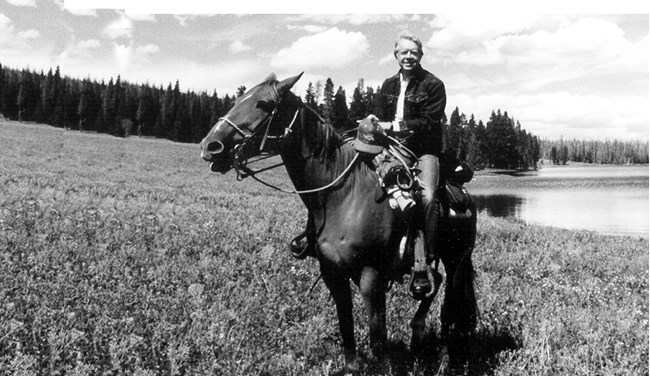
NPS “I have never been happier, more exhilarated, at peace, rested, inspired and aware of the grandeur of the universe and the greatness of God than when I find myself in a natural setting not much changed from the way He made it.” From An Outdoor Journal by Jimmy Carter
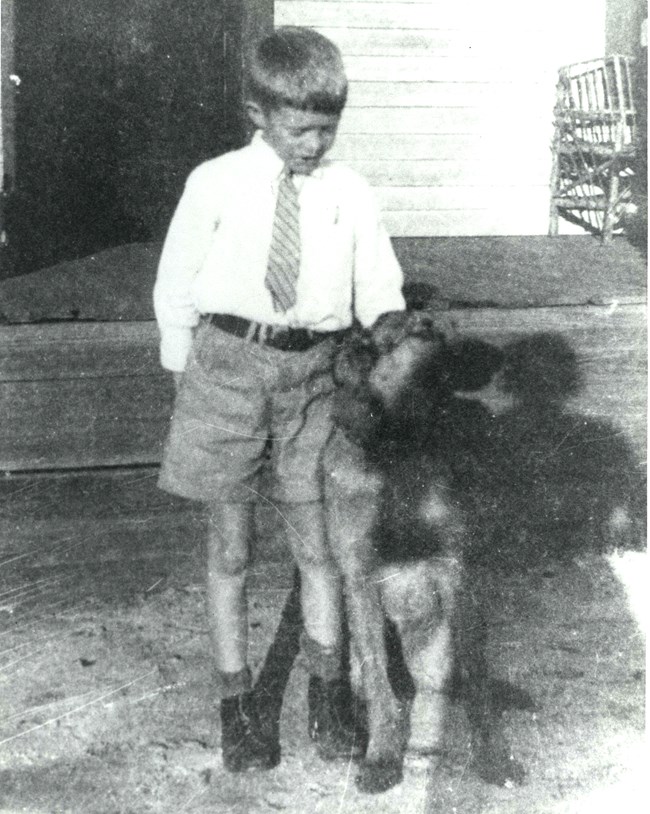
NPS From the time he was four until he was eighteen, young Jimmy Carter grew up in a rural setting in the community of Archery, approximately 2 miles west of Plains. As the son of an innovative farmer, he worked alongside his father and their sharecroppers growing peanuts, cotton, sugarcane, corn, and other row crops. The Great Depression changed the rural economy and the New Deal initiated programs to combat the economic downturn. Many of those programs were meant to help farmers in conserving their precious topsoil, controlling wildfires, and making their lands more productive. Many farmers abandoned marginal cropland and planted pine trees or allowed them to naturally seed to reforest exhausted land. These conservation measures taught the young farm boy early on that the land will take care of people if they take care of it. Besides the government’s New Deal programs, the influence of the church in teaching the doctrine of stewardship, taking care of God’s gifts, was also a part of Jimmy Carter’s early upbringing. The church, the family, and organizations such as the Future Farmers of America helped shape his leadership skills. Although the President-to-be was a budding young farmer, his heart was in the woods. “Growing up as a farm boy, I wanted either a fishing pole or a gun in my hand whenever possible.” His activities included raccoon hunting with black friends (young Carter was valuable because of his tree climbing abilities), and all-night excursions along a creek to snare eels on “set hooks”, which the boys would cook and eat right away. As a person who always worked to improve himself, Carter strived to perfect his bait-casting and shooting skills when he got new and prized equipment. Not all of his fishing was in the Plains area. One of his most memorable trips was a long excursion to the Satilla River in southeast Georgia where he caught many fish, brought home a pet alligator named Mickey Mouse, and above all, strengthened the bond between himself and his father in the beauty of wild country. 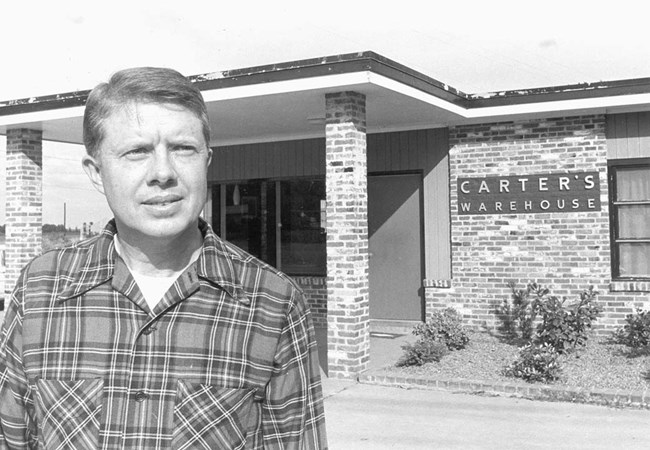
NPS After graduation from the Naval Academy and duties in various Naval assignments, Jimmy Carter returned to Plains to take over the family business. The example of his father, who died in 1953, helped him realize what could be accomplished in a small community. But during the time of his education and military career, agriculture had changed. As Carter was growing up, there were no tractors on the family farm. Now they were essential. He also discovered that the timber growing on the abandoned fields produced substantially more revenue for the farm than anyone had imagined. With new farming methods came increased productivity. Many new laws and programs helped protect land and water. With the coming of the Soil Bank Program, farmers converted more acres of marginal cropland to timber production. Carter continued to pursue his love of outdoor sports while also introducing his young family to the natural world. With three young sons, he assumed his father’s role as teacher, volunteering to become a scoutmaster. As a citizen active in community affairs he worked to organize regional planning efforts along with community improvement projects. 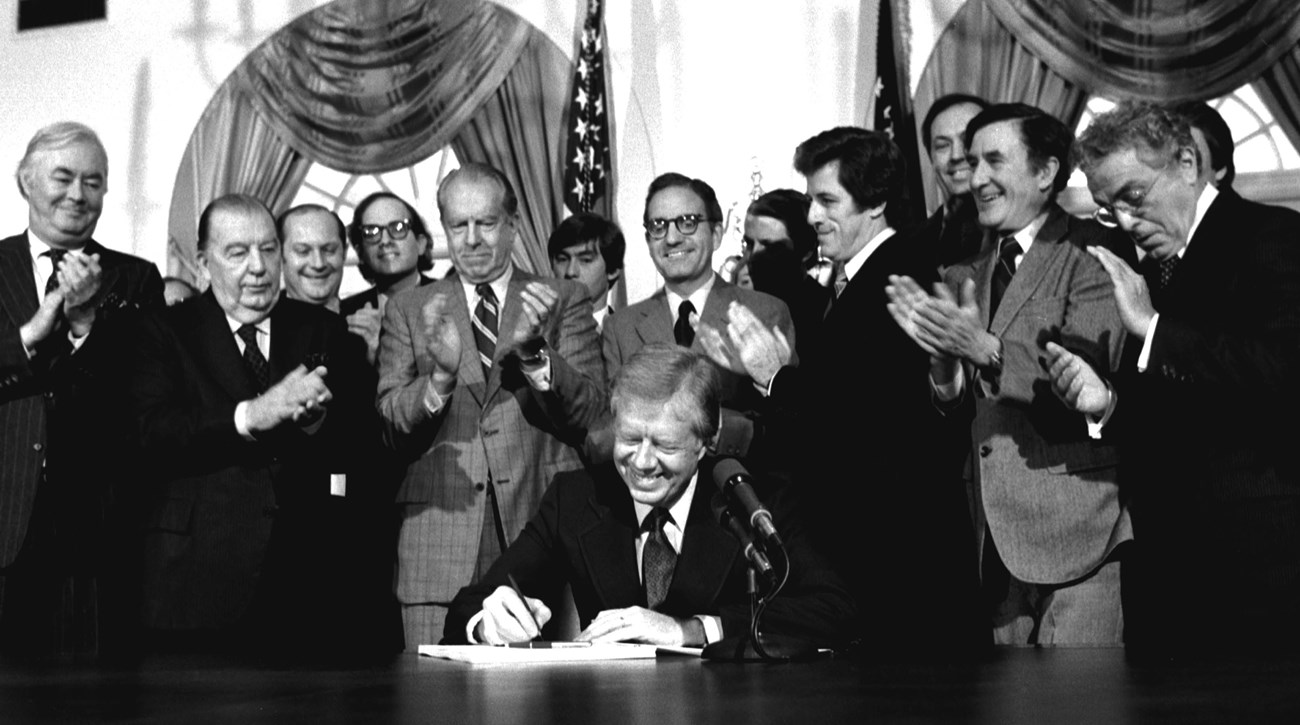
NPS During Jimmy Carter’s years as State Senator, Governor of Georgia, and President, he worked to strengthen environmental laws and often took difficult positions on issues affecting the environment. His most significant achievements are: GOVERNOR •Establishment of the Georgia Heritage Land Trust to purchase and preserve unique lands. •Creation of wildlife enhancement programs such as the reintroduction of wild turkeys. •Suspension of the construction of a large dam on the Flint River south of Atlanta. •Founding the Georgia Conservancy to promote environmental awareness among the public and industry. PRESIDENT •Passage of the Alaskan Lands Bill which protected more than 150 million acres of wild lands and scenic rivers. •“Super Fund” legislation that provided monies and direction to clean up toxic waste dumps. •Establishment of a national energy policy. •Legislation to strictly control strip mining.Recreation time for a governor or president is a rare commodity. Carter spent most of his leisure time outdoors during those years. As governor, Carter took the time to learn to fly-fish for mountain trout. Fly-fishing has become one of his most cherished pastimes. While president, he spent getaway time at Camp David fly-fishing for trout on the compound. Occasionally he and Mrs. Carter would secretly escape the press entourage by taking a short helicopter trip to Spruce Creek in Pennsylvania to catch trout. Another, more celebrated trip was a presidential family vacation in 1978 when the Carters visited Yellowstone National Park and rafted down the Snake River. President Carter chose the natural beauty of Camp David as the most appropriate setting to bring Egypt and Israel together, to negotiate the now famous peace treaty. The Carters cherished their trips back home as well. The Southern forests provided solitude and gave them time to reflect, regenerating them with nature’s beauty. 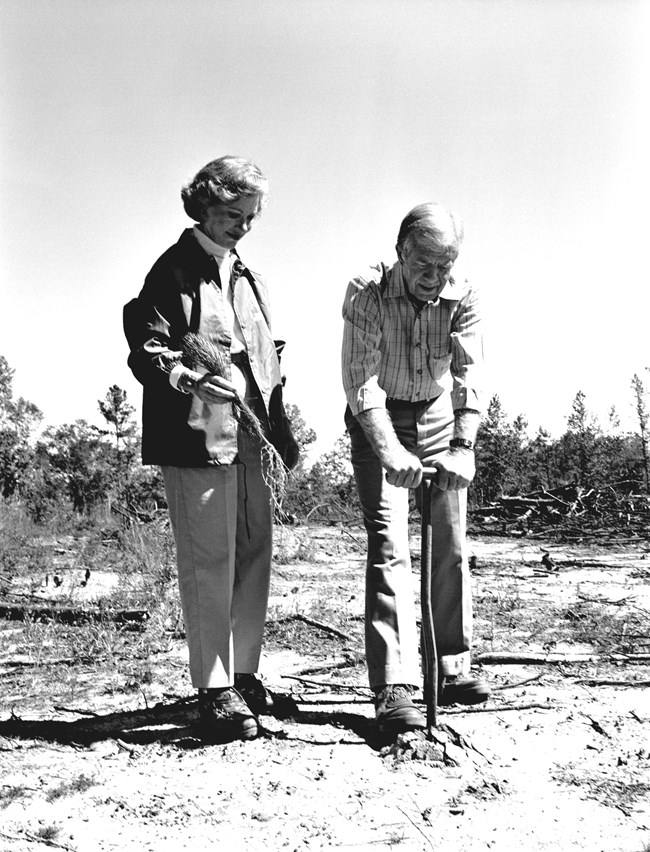
Richard Lubrant The life of a former president is very busy, as Jimmy Carter has shown through his efforts in the humanitarian programs of the Carter Center. Although most of the center’s programs are aimed at health care and nutrition in third world countries, many agricultural programs seek to increase productivity while encouraging sound conservation practices.Jimmy and Rosalynn Carter have personal land holdings in Sumter and Webster counties, Georgia. In the past, these lands were used for agriculture and timber production. After returning from the White House in 1981, the Carters reassessed their land use. Their objectives are to make the lands economically productive, providing for wildlife, recreation, and to be good stewards of the family’s lands. They adopted a land use management plan and initiated steps to meet their goals. The Carters’ land became a certified Tree Farm. To set a good example for others, they have publicly shared their views on the stewardship, reforestation, conservation, and protection of the environment.The Carters prize quiet walks in the woods. These experiences release them from their hectic schedules and allow them to spend time relaxing together as husband and wife.
Jimmy Carter’s Views on the Environment Both Jimmy and Rosalynn Carters’ love of the outdoors is tied to their strong religious beliefs and a special closeness shared among their family. These ties dated back to their early years as they grew up in Plains. The role of the church in their lives, along with memorable outings with family members, has created an especially strong attachment to the outdoors. These values are consequential since they are held by a President who had to make many decisions on issues involving the environment, decisions that affect future generations “It is good to realize that, if love and peace can prevail on earth, and if we can teach our children to honor nature’s gifts, the joys and beauties of the outdoors will be here forever.” From An Outdoor Journal by Jimmy Carter
|
Last updated: October 17, 2023
